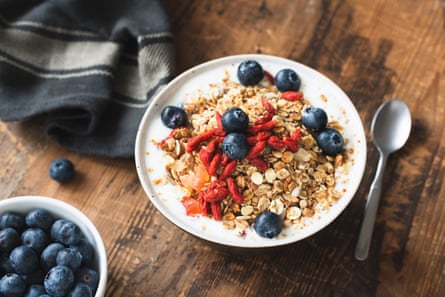TikTok might be the perfect place to learn the latest viral dance moves, but it is certainly not an oracle when it comes to health advice. While it can be a useful source of fun recipes and food ideas, it is also a hotbed of misinformation about what to eat – and what not to eat.
The latest foods in the line of fire are nightshades – a family of plants that includes potatoes, aubergines, peppers, chillies, goji berries and tomatoes. Despite the widespread popularity of nightshades, some celebrities and influencers recommend we cut them from our diet entirely due to the “toxins” they contain. These self-styled health gurus argue that nightshades could be harmful to our health, but dietitians and nutritionists don’t agree.
“Intolerances and severe allergies to any food can happen, but for most people tomatoes, potatoes, aubergines and other vegetables in the nightshade family form part of a healthy diet,” says Natalie Burrows, a registered nutritional therapist and health coach. “When it comes to nutrition, every person is different. What works for one person might not work for another, so blanket advice about nightshades – or any type of plant food – isn’t helpful.”
So, what are the claims about nightshades? And is there any truth to them?
They contain toxins
When people talk about the toxins in nightshades, they are often referring to solanine, which is a type of chemical compound called a glycoalkaloid. This is a poison that the plants develop naturally to protect themselves from external threats such as pests.
“The amount we eat isn’t enough to cause harm,” says Harry Snell, a nutritionist. “There are already certain parts of the plant we don’t eat – such as the stems or the eyes and green parts on potatoes – because they contain more solanine, but the rest is perfectly healthy.” The processes that foods go through to be eaten, including ripening, cooking and peeling, also reduce the levels of solanine. “For example, a raw potato, which we would never eat, might be quite high in solanine, but even this is 10 times less than a dose that might be considered toxic in humans.”
While cases of solanine poisoning have happened – the most well-known incident was in the late 1970s, when a group of schoolchildren were poisoned by green potatoes – they are rare and usually linked to improper storage or preparation of food. Snell points out that, for most people, nightshade plants are tolerated well by the digestive system and make a healthy addition to any diet.
As well as containing lots of vitamins, minerals and antioxidants, which can prevent or delay cell damage, red, blue and purple vegetables contain pigments called anthocyanins, which help to prevent cancer.
They make inflammatory conditions worse
Some older studies have indicated that the glycoalkaloids found in nightshades might cause problems for people with inflammatory conditions, such as rheumatoid arthritis. However, Dr Bridgette Wilson, a gastroenterology dietitian specialising in gut health at CityDietitians, says there isn’t enough robust evidence to support this theory. In fact, research shows that plants such as aubergines could even reduce inflammation, due to their high levels of antioxidants.
“If you suffer from rheumatoid arthritis, or another inflammatory condition, and you think a certain food may be exacerbating symptoms, then it is important to work with a dietitian to determine the exact cause,” says Wilson. “Blanket elimination isn’t a good idea and can prevent you from getting certain nutrients.” She also notes that anything can be unhealthy if consumed in large quantities. “Even water is toxic if you drink enough of it. The key with everything is moderation.”

Snell argues that the typical western diet, which is high in ultraprocessed sweets, snacks and fizzy drinks, is much more likely to negatively affect inflammatory diseases, and lead to illness, than eating nightshades. “Obesity rates are rising and many of us aren’t meeting the recommended quota of 30g of fibre a day,” he says. “I don’t think demonising certain plant foods is helpful. The last thing we want to do is scare people away from eating more plant food when there is no real need.”
For people who have a diet that is higher in trans fats, salt, sugar and ultraprocessed soft drinks, the best place to start would be to introduce more fibre and whole foods. Simple ways to do this include adding seeds to soups, porridge and salads and increasing your intake of pulses such as chickpeas, lentils and beans, as well as fruits and vegetables.
READ RELATED: Why are Virgin Media and BT so quiet about broadband ‘social tariffs’?
They can aggravate autoimmune conditions
There is confusion about lectins, a type of protein that binds to carbohydrates. While they are present in all vegetables, some nightshades – including aubergines, tomatoes and goji berries – have particularly high amounts. Most healthy people can tolerate these during the digestive process with no problem, with studies showing they can help to prevent disease. However, they might aggravate irritable bowel syndrome (IBS) or autoimmune conditions – especially when consumed in high quantities.
True intolerances, says Burrows, are rare: “We often find that the biggest issue isn’t the food itself, but the gut environment it is going into.
“If you have been through a period of high stress, eating less fibre than you need, have been unwell or taken a course of antibiotics, for example, all of these things might affect your gut health,” she says. “If you are experiencing symptoms such as migraines, rashes, bowel changes or fatigue, your first point of call should be your GP, to rule out any medical conditions.”
Once you have ruled out illnesses, she says, an elimination diet can help to determine if you have any intolerances. “Start with a food diary, to get an indication of what foods might be causing you problems. For some people, that might be certain fruits or vegetables; for others, it might be lactose or something else. Every elimination diet needs to be done for a period of time – usually two to eight weeks – and should be monitored by a registered nutritional therapist or dietitian.”
After a period of restriction, foods should be reintroduced in a controlled way. “Everyone is different; that’s why taking a personalised approach with a professional is so important.”
They contain histamines
Some nightshade plants, such as tomatoes and aubergines, are high in histamines, which many people worry will make them unwell. While histamine intolerance is a documented condition, Wilson says it is rare. “It often presents with IBS symptoms, as well as other issues such as hives and itching,” she says. “If a prescribed IBS diet isn’t working, a specialist dietitian may consider this as a differential diagnosis, especially if someone has a history of asthma, hay fever or eczema.”
However, it is important that people don’t self-diagnose, because the condition isn’t common and it could lead to people unnecessarily eliminating foods. Like Burrows, Wilson says that elimination should be temporary where possible and that foods should be reintroduced over time. “Research shows that restricting or eliminating foods for a long period can make IBS symptoms worse, because of the effect this has on gut bacteria, thus having the opposite effect of what we hope to achieve.”
Are we worrying for no reason?
With so much conflicting advice available online, Burrows says it is no surprise that we are seeing a rise in the “worried well” – people with no physical symptoms who are overconcerned about their health. “They often end up following fad ‘wellness diets’, which involve cutting out certain foods. But nightshade vegetables contain some really important nutrients,” she says.
For example, potatoes contain resistant starch, which passes through you without being digested and can help to prevent diseases such as colon cancer and diabetes. They also have large amounts of potassium, which is an essential mineral that helps our cells function, and vitamin C, which is essential for eye health, immunity, strong bones, wound healing and more.
Meanwhile, tomatoes are a key source of lycopene, the pigment that gives them their red colour. Early studies indicate this could be beneficial for disease prevention. Tinned tomatoes are a cheap base for many different sauces and casseroles, making them an easy, healthy addition to any meal.
As well as being popular in the UK, nightshade vegetables are a staple part of the cuisine in countries including Italy and Spain. Following a Mediterranean diet has been proved to reduce the risk of cardiovascular disease. “There is also increasing evidence that widening the range of plants you eat can improve gut health,” says Burrows.
Snell adds that the anxiety caused by fad diets and confusing online health advice can be detrimental to health. “It won’t make you healthier if you are busy worrying about the toxins in certain plants. If you do suffer with any digestive symptoms, that anxiety could make things worse.”




